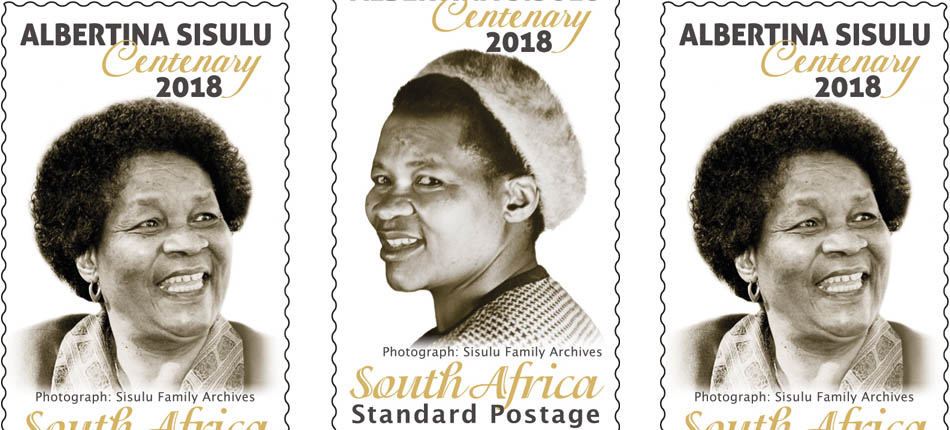

Albertina Sisulu CentenaryText by Dineo Poo Technical information:Stamp issue date: 22 February 2019 The stamps that will be issued commemorate the Centenary of the birth of Nontsikelelo Albertina Sisulu. She was a dutiful daughter, mother, wife, neighbour, health care worker, freedom fighter and ultimately to those who knew her; a caring, resourceful and committed person. Nontsikelelo, meaning the blessed girl in isiXhosa, was born healthy on 21 October 1918 despite her mother’s affliction with the Spanish flu that had killed over 30 000 people in the Transkei, Eastern Cape. Nontsikelelo assumed the name Albertina when she started school as African children had to have ‘Christian’ names for school. Upon completing her high school studies she trained as a nurse at a Johannesburg “Non-European” hospital called Johannesburg General in January 1940. When Albertina met Walter Sisulu in 1941 he was already a staunch member of the African National Congress (ANC) and her political awareness was only just budding. Their relationship was to be a truly remarkable love story. They were married in 1944; Nelson Mandela and his then wife Evelyn were best man and bridesmaid. Albertina joined the ANC Women’s League when it was formed in 1948 thus begun the life of Albertina as an activist in her own right. After joining the ANC Women’s League, Albertina began to assume leadership roles in the ANC and in the Federation of South African Women (FEDSAW) in the 1950s and was one of the organizers of the historic anti-pass women’s march in 1956. Albertina and her family were subjected to a life of uncertainty and financial instability as she could be detained or arrested at any time from the late 1950s to the 1980s. She was the first person to be detained under the General Laws Amendment Act. The Act gave the police the power to hold suspects in detention for 90 days without charging them, and in Albertina’s case she was placed in solitary confinement incommunicado for almost two months. This was a precursor to her life as a banned person in South Africa. In July 1981, Albertina had been banned for 18 years, the longest any person in South Africa had been banned. Fortunately she was very resourceful and managed to keep her head above the waters and to keep her family and extended family intact throughout. In 1983 Albertina was elected as one of three presidents of the United Democratic Front (UDF) along with Oscar Mpetha and Archie Gumede. The UDF was an umbrella body for more than 400 organizations throughout the country at its inception; these included trade unions, women’s groups, sports groups and faith-based and civic organizations. The UDF was able to fill the void left open by the banning of political organisations and it worked hard in intensifying the fight against the apartheid government. Albertina was accommodative of others in the struggle who were not members of the ANC, UDM and FEDSAW. She worked for Dr Abu Asvat who was politically aligned with AZAPO (Azanian People’s Organization) and her daughter, Lindiwe was active in the Black People’s Convention (BPC) at some stage before going into exile. When her husband, Walter, was released from prison as one of the Rivonia Trialists together with Nelson Mandela and others, they had been apart for at least 25 years. She had kept the home fires burning and had realised the fruit of her activism and sacrifice. The stamp issue features two standard postage rate stamps on a sheet of ten; there is no First Day Cover. The images are of a young and an elderly Albertina. The stamps were designed by Thea Clemons of Philatelic Services. Sources and acknowledgements: Ayanda Sisulu, Albertina Sisulu’s granddaughter |